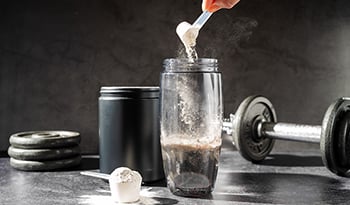ZMA Supplements: Improve Sleep + Recovery

What Is ZMA?
ZMA (zinc magnesium aspartate) is a supplement made up of zinc, magnesium, and vitamin B6. This combination may have benefits for sleep muscle growth and recovery.
Zinc is often paired with magnesium in supplemental form because they work synergistically, meaning each mineral helps the body absorb and utilize the other more effectively. Essentially, magnesium can help regulate zinc levels, while zinc can enhance the absorption of magnesium.20
While magnesium is a ubiquitous element that plays a fundamental role in many cellular reactions, for our purposes here, there appears to be an inverse relationship between magnesium and cortisol, a hormone reported to have negative effects on strength gains and muscle mass during training.16 That is, some research suggests too little magnesium can help spike the steroid hormone cortisol, which is associated with reduced muscle strength and gains.21
Benefits Of ZMA Supplements
Sleep
If you’re looking to boost your health and performance, a few recommendations rival one that’s absolutely free: Get a good night’s sleep. Sleep boosts muscle-protein synthesis and anabolism, makes you feel more energetic, reduces depression and improves memory, increases your athletic performance, and elevates your mood.1 More zzzzz’s gets straight A’s when it comes to creating an optimal environment around which your body recovers from the stressors of life, including your workouts.
That apparently is easier said than done. The National Heart, Lung, and Blood Institute reports that 50-70 million Americans have chronic sleep disorders, and a 2024 Gallup Poll indicates only 26 percent of adults get eight hours of sleep nightly.2,3 A 2022 study by Statistics Canada found poor sleep-facilitating behaviors “prevalent” among the sampled 18-64 age group, with 23 percent not meeting sleep duration recommendations and another 39 percent not meeting sleep quality guidelines.4
Concerning sleep quantity and quality, supplementation with zinc has shown positive results. A study by Cherasse et al (2017) said: “Recent research has concluded that zinc serum concentration varies with the amount of sleep, while orally administered zinc increases the amount and quality of sleep in mice and humans.”18 A 2024 systematic review suggests that zinc supplementation may lead to improvements in sleep quality.19
If our advice consisted of simply recommending you get a better night’s sleep, you’d have done it by now. Let’s take a closer look at what’s going on, and how one studied supplement can help.
Acute and chronic sleep deprivation is a potent catabolic stressor, increasing the risk of metabolic dysfunction and loss of muscle mass and function.5 Acute sleep deprivation has been found to decrease muscle-protein synthesis and promote a less anabolic hormonal environment.6
Further research has noted a lack of sleep with impaired maximal strength in compound (multi-joint) movements.7 An Australian study determined that “sleep restriction can have detrimental effects on the processes that maintain muscle mass… (which) help to explain previous reports of reduced muscle mass in those experiencing insufficient sleep.”8
None of which is good news if this aspect of your recovery is inadequate.
Testosterone and Muscle Growth
One of the primary functions of testosterone – among many — is to build muscle. Hormones are chemical messengers that tell your body how to work and what to do. Everyone makes testosterone, but men have levels about 10-20 times higher than women.9
What’s more, testosterone levels appear to be declining across the board worldwide, in part because of changes in body weight, physical activity, diet, alcohol consumption, sleep, and even environmental toxins (known more nefariously as endocrine-disrupting chemicals).10
Research suggests that insufficient sleep and sleep disorders negatively impact testosterone levels.11 That may well be the mechanism linking sleep issues with suboptimal results in the gym.
One culprit here may be zinc, found in oysters, seafood, chicken, and red meat, an essential trace mineral involved in a range of biochemical processes, including testosterone production and immune and metabolic function. One study found that zinc deficiency can lead to low testosterone.12 Adequate zinc levels are crucial for maintaining optimal testosterone levels and healthy sperm production, and zinc deficiency can lead to reduced testosterone and impaired fertility in men.13
In one study, serum zinc was positively correlated with total testosterone, and moderate supplementation played an important role in improving androgen.14 In another study, researchers noted: “Zinc may play an important role in modulating serum testosterone levels in normal men.”15
Exercise can deplete zinc, and regular activity can exacerbate the problem.16 A study by Kilic, et al (2006) examined the effect of intense exercise on professional athletes and its effect on thyroid and testosterone levels. The study determined that intense exercise led to a significant drop in both thyroid and testosterone levels. Further, the researchers found that a four-week course of oral zinc supplementation prevented this drop.17
Zinc And Magnesium Deficiency
Unfortunately, there’s a dearth of research specific to zinc and magnesium deficiency and how that affects the production of testosterone and insulin-like growth factor (IGF-1) and their effect on recovery, anabolism, and strength.8 In one study, Brilla and Conte (2000) reported that a zinc-magnesium formulation increased testosterone and IGF-1, leading to greater gains in football players.22
Athletes have been reported to have lower levels of zinc and magnesium, possibly due to increased sweating while training or inadequate intake in their diets. Additionally, zinc and magnesium supplementation have been reported to have positive effects on resistance training athletes.8
Zinc and magnesium supplementation appears to be effective, most especially for those who are deficient, as they may well support both sleep and endogenous testosterone production.
Should I Supplement With ZMA?
The decision to supplement starts with an evaluation of your diet and whether you’re consuming enough of the right kinds of whole foods while also considering your sleep habits and how a shortfall of some key micronutrients might adversely affect you.
Because deficiencies in zinc and magnesium are linked to declines in athletic performance and muscle mass, supplementation is a smart insurance policy to maximize gains and minimize losses. Read product labels as directed and do not take more than recommended.
References:
- “Does lack of sleep hinder muscle growth or performance?, Nov. 2019. ISSA
- “What are sleep deprivation and deficiency?” Mar 2022. NHIBI https://www.nhlbi.nih.gov/health/sleep-deprivation.
- “Fioroni S, Foy, D. “American sleeping less, more stressed. April 2024. Gallup https://news.gallup.com/poll/642704/americans-sleeping-less-stressed.aspx.
- Wang, C., Colley, R., Roberts, K, Chaput, J.P., Thompson, W. “Sleep behaviors among Canadian adults: Findings from the 2020 Canadian community health survey healthy living rapid response module. Statistics Canada, 2022.
- Lamon S, Morabito A, Arentson-Lantz E, Knowles O, Vincent GE, Condo D, Alexander SE, Garnham A, Paddon-Jones D, Aisbett B. “The effect of acute sleep deprivation on skeletal muscle protein synthesis and the hormonal environment.” Physiological Reports 2021 Jan;9(1).
- Dattilo M, Antunes HK, Medeiros A, Mônico Neto M, Souza HS, Tufik S, de Mello MT. “Sleep and muscle recovery: endocrinological and molecular basis for a new and promising hypothesis.” Medical Hypotheses 2011 Aug;77(2):220-2.
- Knowles O, Drinkwater E, Urwin C, Laman S, Aisbett B. “Inadequate sleep and muscle strength implications for resistance training.” Journal of Science and Medicine in Sport 2018.
- Saner, N. et al. “The effect of sleep restriction, with or without high-intensity interval exercise, on myofibrillar protein synthesis in healthy young men. Journal of Physiology 2020. 598.8, 1523-1536.
- “Testosterone.” Cleveland Clinic https://my.clevelandclinic.org/health/articles/24101-testosterone.
- “Why are testosterone levels decreasing?” Sept. 2022. Cleveland Clinic https://health.clevelandclinic.org/declining-testosterone-levels.
- Leproult R, Van Cauter E. Effect of 1 week of sleep restriction on testosterone levels in young healthy men. Journal of the American Medical Association 2011 Jun 1;305(21):2173-4.
- Prasad AS, Mantzoros CS, Beck FW, Hess JW, Brewer GJ. “Zinc status and serum testosterone levels of healthy adults.” Nutrition. 1996 May;12(5):344-8.
- Fallah A, Mohammad-Hasani A, Colagar AH. “Zinc is an essential element for male fertility: A review of Zn roles in men’s health, germination, sperm quality, and fertilization.” Journal of Reproduction & Infertility 2018 Apr-Jun;19(2):69-81.
- Te L, Liu J, Ma J, Wang S. “Correlation between serum zinc and testosterone: A systematic review.” Journal of Trace Elements in Medicine and Biology 2023 Mar;76:127124.
- Prasad AS, Mantzoros CS, Beck FW, Hess JW, Brewer GJ. “Zinc status and serum testosterone levels of healthy adults.” Nutrition 1996 May;12(5):344-8.
- Wilborn CD, Kerksick CM, Campbell BI, Taylor LW, Marcello BM, Rasmussen CJ, Greenwood MC, Almada A, Kreider RB. “Effects of zinc magnesium aspartate (ZMA) supplementation on training adaptations and markers of anabolism and catabolism. Journal of the International Society of Sports Nutrition 2004 Dec 31;1(2):12-20.
- Kilic M, Baltaci AK, Gunay M, Gökbel H, Okudan N, Cicioglu I. “The effect of exhaustion exercise on thyroid hormones and testosterone levels of elite athletes receiving oral zinc.” Neuro Endocrinol Letters 2006 Feb-Apr;27(1-2):247-52.
- Cherasse Y, Urade Y. “Dietary zinc Acts as a sleep modulator.” International Journal of Molecular Sciences 2017 Nov 5;18(11):2334.
- Jazinaki MS, Gheflati A, Moghadam MRSF, Hadi S, Razavidarmian M, Nezhad MY, Akhtari H, Nematizadeh M, Safarian M. “Effects of zinc supplementation on sleep quality in humans: A systematic review of randomized controlled trials.” Health Science Reports 2024 Oct 6;7(10):e70019.
- Hamedifard Z, Farrokhian A, Reiner Ž, Bahmani F, Asemi Z, Ghotbi M, Taghizadeh M. “The effects of combined magnesium and zinc supplementation on metabolic status in patients with type 2 diabetes mellitus and coronary heart disease.” Lipids in Health and Disease 2020 May 28;19(1):112.
- Katsuhara S, Yokomoto-Umakoshi M, Umakoshi H, Matsuda Y, Iwahashi N, Kaneko H, Ogata M, Fukumoto T, Terada E, Sakamoto R, Ogawa Y. “Impact of cortisol on reduction in muscle strength and mass: A Mendelian randomization study.” The Journal of Clinical Endocrinology & Metabolism 2022 Mar 24;107(4):e1477-e1487.
- Brilla L, Conte V. “Effects of a novel zinc-magnesium formulation on hormones and strength.” Journal of Exercise Physiology 2000 3:26–36.
DISCLAIMER:This Wellness Hub does not intend to provide diagnosis...
















































































 Table of Contents
Table of Contents
















